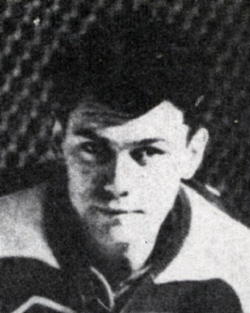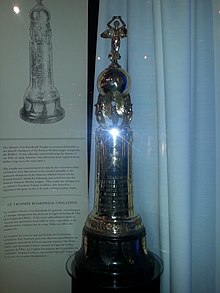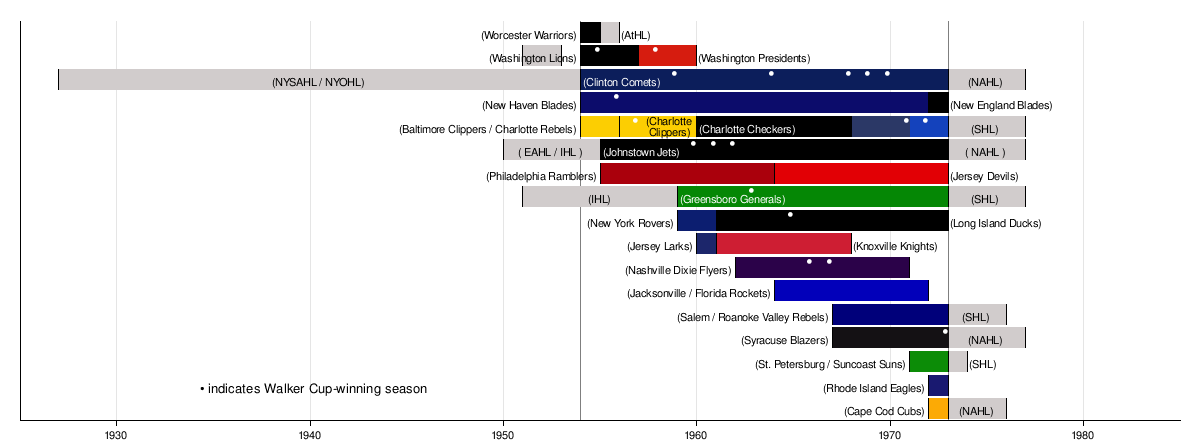The Dublin City Cup is a defunct Irish football tournament which was played for by all League of Ireland sides. It ran from 1933 and ran uninterrupted until 1973. In the 1975–76 season it was revived and played for by sides who did not reach the League of Ireland Cup quarter-finals. In 1983–84 it was revived again but only eight teams were invited to play, the six Dublin sides along with Drogheda United and Dundalk.

The Washington Lions were a professional ice hockey team based in Washington, D.C. The Lions were founded as a member of the American Hockey League in the 1941–42 season. They played for two seasons and then disbanded during World War II. Another Washington Lions team played in the Eastern Hockey League from 1944–47. The AHL Lions were resurrected in 1947. Following the 1948–49 season, the team was relocated to Cincinnati, Ohio as the Cincinnati Mohawks. The void was filled by a second team of the same name playing in the Eastern Hockey League, from 1951–53, and 1954–57, who later became the Washington Presidents, when purchased by Harry Glynne III, and Jerry DeLise.

Thomas Finan Lockhart was an American ice hockey administrator, business manager, and events promoter. He was president of the Eastern Hockey League from 1933 to 1972, and was the founding president of the Amateur Hockey Association of the United States (AHAUS) in 1937, which later became USA Hockey. He led AHAUS into the International Ice Hockey Association in 1940, then into the Ligue Internationale de Hockey sur Glace in 1947. He managed operations at Old Madison Square Garden, introduced fans to innovative on-ice promotions which made amateur hockey a profitable event. He was the business manager of the New York Rangers for six years, and was inducted into both the Hockey Hall of Fame and the United States Hockey Hall of Fame, and is a recipient of the Lester Patrick Trophy for building the game in the United States.

The Johnstown Jets were a professional ice hockey team from Johnstown, Pennsylvania. The Jets were founded in the Eastern Amateur Hockey League for the 1950–51 season, playing at the newly constructed Cambria County War Memorial Arena. The Jets won consecutive EHL championships in 1951–52 and 1952–53.

Frederick Leo Gerald Burchell was a Canadian professional ice hockey player. He played four games in the National Hockey League with the Montreal Canadiens: two games in each the 1950–51 and 1953–54 seasons. The rest of his career, which lasted from 1949 to 1966, was spent in the minor leagues. Burchell was born in Montreal, Quebec.
The Yugoslav Ice Hockey League was the top ice hockey league in the old Yugoslavia.

The Charlotte Checkers were a minor league professional ice hockey team based in Charlotte, North Carolina. The team began as the Baltimore Clippers in 1954, playing in the Eastern Hockey League. When the arena in Baltimore burned down, the team briefly played as the Charlotte Rebels, before permanently relocating to the Charlotte Coliseum in 1956, becoming the Charlotte Clippers. The team was renamed the Checkers in 1960, and played its final four seasons in the Southern Hockey League, before folding in 1977. The Clippers/Checkers franchise won five playoff championships in its existence, and were the first team to be based in the Southeast United States.
The Boston Olympics are a defunct ice hockey team which operated as a farm team for the Boston Bruins. They began play during the 1940–41 Eastern Amateur Hockey League season. The Olympics were often referred to by the shortened name the ‘Pics and the franchise remained active until the 1951–52 season.
The Johnstown Blue Birds were a professional ice hockey team from Johnstown, Pennsylvania. The Blue Birds played one season in the former Eastern Hockey League before folding after the 1941-42 season.
The Saskatchewan Senior Hockey League (SSHL) was a senior amateur ice hockey league that operated in the Canadian province of Saskatchewan on-and-off from 1938 to 1971.

Doug McMurdy was a Canadian professional ice hockey player, and coach. He played both centre and defence, and skated for 376 games in the American Hockey League, mostly with the Springfield Indians. McMurdy was the inaugural winner of the Red Tilson Trophy, as the most outstanding junior player in the Ontario Hockey Association (OHA) in 1945.
The Baltimore Clippers were a minor league professional ice hockey team from in Baltimore, Maryland, playing in the Eastern Amateur Hockey League at Carlin's Iceland. The team began play in the 1944–45 season known as the Baltimore Blades, and were renamed the Clippers from 1946 to 1949. The team name paid homage to local history in the Baltimore Clipper, and the Port of Baltimore. The Clippers ceased operations during the 1949–50 season.








